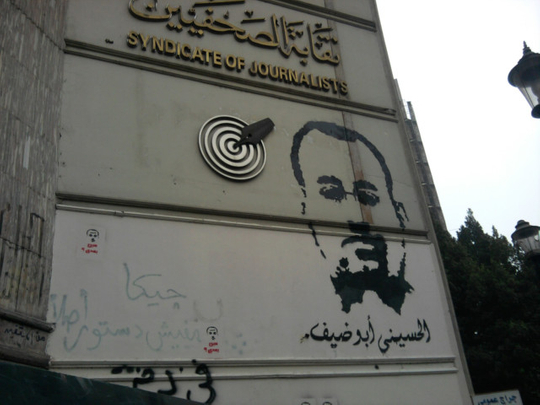
Cairo: Two years after the eruption of an uprising against the now-toppled president Hosni Mubarak, Egypt’s media people say they are increasingly the target of restrictive measures and jailing penalties under the country’s Islamist rulers.
A dozen media personalities have recently been sued by Islamists for purportedly defaming the incumbent President Mohammad Mursi in press writings or TV programmes. The latest is Jamal Fahmi, a leftist columnist writing in the independent newspaper Al Tahrir, which is an outspoken critic of Mursi and his group, the Muslim Brotherhood.
“The president has added me to a long list of journalists, opinion writers and media figures who are being legally chased and intimidated in an unprecedented way,” said Fahmi.
“What is happening is part of a policy aimed at muzzling mouths and covering up the regime’s abysmal failure in running the country’s affairs,” he added.
The nation’s journalists have staged a series of angry protests since December when Al Hussein Abu Deif, a photojournalist working for the opposition weekly Al Fajr, was killed outside the presidential palace while covering deadly clashes between Mursi’s backers and opponents.
Opposition activists claimed that the Brotherhood followers gunned down Abu Deif for his public criticism of the powerful group.
“This incident is an indication of the course of action to which the Brotherhood will resort in the future if it fails to face the opposition media through the legislation it (Brotherhood) plans to undermine the media,” wrote Khaled Al Serjani of the independent newspaper Al Masri Al Youm.
Mursi took office in June as Egypt’s first elected civilian president. The mostly secular opposition is scathingly critical of Mursi for taking moves allegedly designed to curb basic freedoms and tighten Islamists’ hold on power.
An Islamist-drafted constitution, adopted by a narrow margin in a public vote last month, allows newspapers to be closed by court rulings. Critics also say the charter, while guaranteeing freedom of the press, does not revoke jail terms in media offences, a demand long pursued by Egypt’s journalists.
According to the Arab Network for Human Rights Information, a Cairo-based non-governmental organization, the number of media workers accused of insulting Mursi is four times higher than those who faced the same charges under Mubarak’s 30-year rule.
“Forty violations of the freedom of expression, including lawsuits for defaming Islam, were recorded in the first 100 days in office of Egypt’s first elected president,” the group said in a report released this week.
“In his second 100 days in office, the president set a record in the number of cases filed against writers, journalists and TV stations accusing them of insulting the president,” added the group in the report titled “Crime of Insulting the President – a Crime of an Autocracy”.
Egypt’s most popular satirist Bassem Youssef is to go on trial in March to face charges of mocking Mursi on his weekly show “The Programme”. Earlier this month, an Egyptian court dismissed one of several such cases brought against Youssef by a Brotherhood lawyer.
Mursi’s office has said the bulk of suits against opponents have been filed by individual citizens.
“The presidency welcomes any constructive criticism and opposes blocking any opinion based on sound grounds,” said Mursi’s spokesman, Yasser Ali. “But when the issue is related to accusations to the president that he threatens national security, judicial investigations become necessary to verify such accusations. The person who made the claims has to bear responsibility.”












